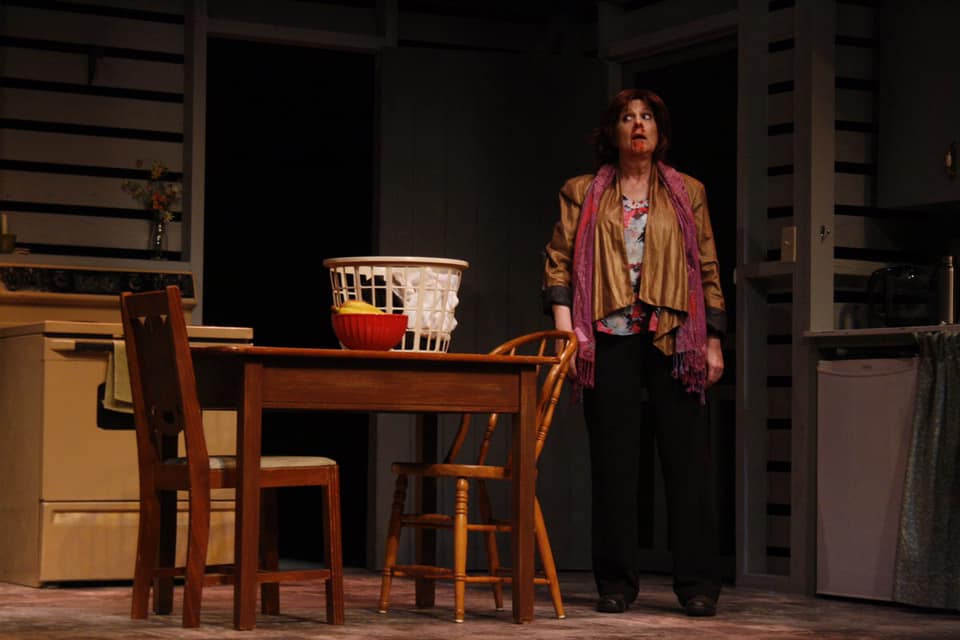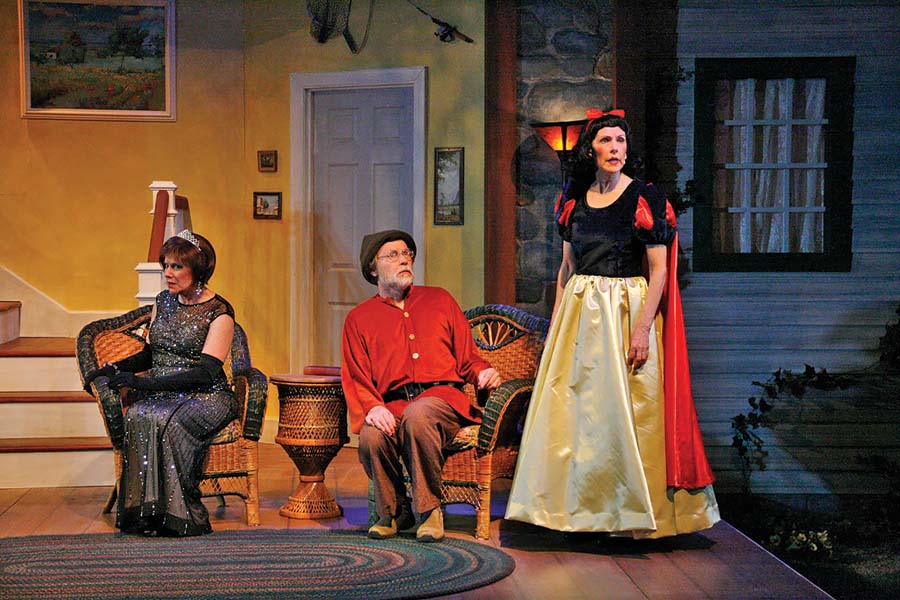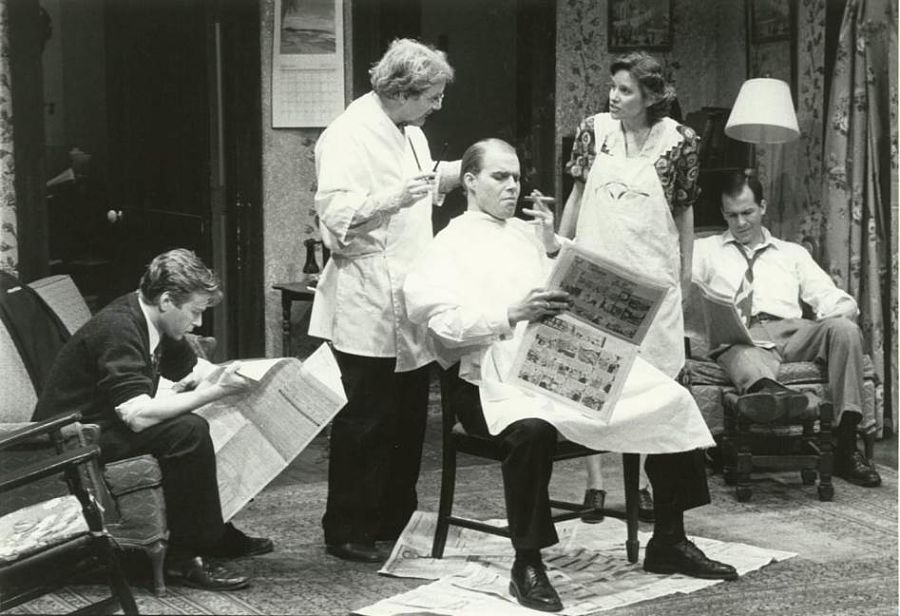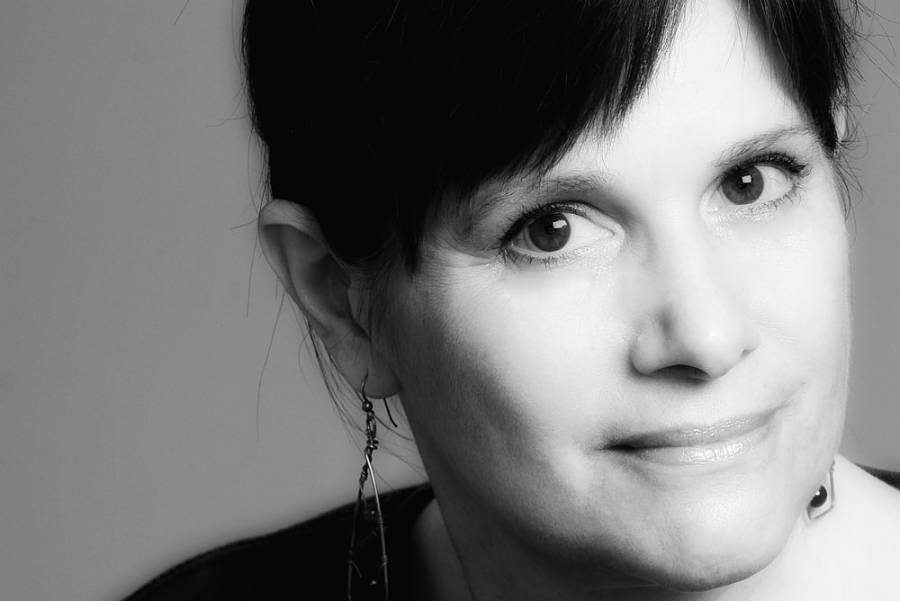Laurie McCants has never been the sole artistic leader of Bloomsburg Theatre Ensemble. That’s because, since its founding in 1978, this small, indomitable Pennsylvania theatre has been just what its name indicates: a true ensemble, with decisions made by consensus, and responsibility and pay shared equitably. McCants, whose last day as a member of BTE is Feb. 29, was among the troupe’s founding members (and is only the second, after Gerald Stropnicky, to become an emeritus member). In the 42 years since helping to start the company, she has appeared in countless plays, most recently Lucy Kirkwood’s The Children. I spoke to her recently about her career and the legacy she leaves behind at BTE.
ROB WEINERT-KENDT: Congratulations on a good long run. Why leave now?
LAURIE MCCANTS: Well, I’m 67. Also, there’s a younger contingent of ensemble members, and I feel quite confident that they are going to carry it on. So I feel like it’s time to, you know, gracefully withdraw, so they can shape their own shared leadership and shape their own future together as artists.
What brought you to Bloomsburg originally?
It was in 1976, and we came to study with Alvina Krause. She had been a very famous acting teacher at Northwestern University, and for many years she ran a theatre in the summer at a summer resort area near Bloomsburg called Eaglesmere Playhouse. Her longtime companion, Lucy McCammon, lived here in Bloomsburg, so after Ms. Kraus retired from Northwestern, Lucy said, “Come on, Alvina, live with me.” So Alvina ended up in Bloomsburg, but she wasn’t ready to stop teaching. When we came to study with her in learning to act the plays of Chekhov she was 83.
Wow.
And the theatre company was born out of those young actors who had come to study with Ms. Krause. We ended up staying and starting a theatre.
How would you characterize her approach to acting? Was it fairly mainstream American Method, or scene study, or did she have her own approach?
It was her own thing. She would always say, “People told me I should write a book. How would I ever write this down?” What she gave me was a respect for the playwright. She adored playwrights. She loved Shakespeare. She loved Chekhov. She loved Shaw. She spoke for the playwright, and also a passion for actors as the central artists—actors as theatremakers. She believed the future of theatre lay in actors deciding to band together and keep theatre alive by making their own.
Is that why Bloomsburg started as an ensemble?
Totally, and with the actors at the helm. And we have remained over the 42 years—we’re not just actors, we’re directors, we’re designers, we’re writers. We’re also administrators, we’re occasionally set designers, ticket sellers—the whole schmear. The ensemble is the artistic direction of the theatre company. Even when Ms. Krause was alive, we had no single artistic director, and we never have; it has always been a group-held right and responsibility. We’re actually facing an interesting time right now, because we have several people on our technical staff, our production team, who have been with us for a long, long time, and they have stepped forward and have said they want to be ensemble members too. And we’re figuring out how to make that happen.

Forgive my skepticism, but I’ve always wondered how consensus-based ensembles get anything done. There still has to be a division of labor—someone has to do the fundraising and take out the trash, right?
Yes, we actually have a full-time administrative staff now and a full-time production team. Each ensemble member has a liaison role with someone on the staff, and that’s how we handle the sort of responsibilities that an artistic director would hand to the rest of the team.
Were there ever points along the way where you thought, I would love to work in a company where someone just tells me what I need to do today, rather than reinvent the wheel with every decision? Or do I have a caricatured view of ensemble leadership?
Oh my goodness. It can become exhausting, and the group dynamic is—well, it’s an interesting sea to ride. And it changes over the years. We are continually surprising each other. But in terms of determining the artistic direction of our company, every single ensemble member feels that they would never, ever want to give that up. It’s the reason why we’ve lasted 42 years: because our artists have the power.
But that’s not the only reason. We have a remarkable community here. Our audience has been amazing. It has been such a joyous and interesting path that ensemble members have had here, because we’re also members of the community.
Tell me more about the community. You’re in coal country, is that fair to say?
We are ringed by coal country, but our town was primarily a textile town—carpet, fabric. And of course that manufacturing has undergone a lot of change over even the time we have been here. Now we’re primarily a college town. Bloomsburg University is here, and it’s part of downtown. So we’re very lucky in that regard. The carpet manufacturing has taken on a really interesting identity, in that the very skilled carpet weavers who were put out of work when the big mill moved further down South, they started their own company, and that company is doing very well. They manufacture specialty carpets, and we get their remnants. So the steps in our auditorium are carpeted with the leftovers from the Metropolitan Opera House from New York city.
You’re about 50 miles from Reading, Pa., where Lynn Nottage set Sweat. How did the Rust Belt decline she wrote about affect your area, and how have you responded to it in your work?
It’s interesting. In a lot of ways, the 2008 downturn that a lot of theatre companies faced didn’t affect us that much. We don’t have that much corporate support—we don’t have corporations around here. Mostly we are buoyed, kept afloat by the very broad base of folks who give us $25 a year. And that didn’t change; that remained the same.

Four decades is a long time, but if you had to, could you name a few highlights of your time at the theatre?
I’m most proud of the work that we have made about the place where we live. Plays like Hard Coal: Life in the Region involved tons of going out and meeting with folks and gathering their stories and songs and memories, and incorporating that into a major mainstage performance that was stunning and so meaningful for the folks around here. We also created a classroom show called Patchworks about life in the patch towns—coal mining towns that companies set up for their workers. That’s an American immigrant story that’s just incredible. And the ripple effects of our work on Hard Coal and on Patchworks has been pretty remarkable.
A few years ago I got a phone call from a young woman who grew up in our area. She was working with not-for-profits in Philadelphia, and a major choir there had received a huge grant from the Pew Foundation to commission a choral piece about coal mining in Pennsylvania. And my young friend said, “They don’t know anything about coal mining in Pennsylvania, so I put you on as a ‘coal region consultant.’” I said, “Oh great, this will make me so happy. I’m going to go back and see all my friends again. Who is the composer?” And she said, “It’s Julia Wolfe.” And I just almost dropped the phone because Julia Wolfe was Bang on a Can—she’s one of my favorite composers. So I got to squire Julia all over the region and introduce her to the people whose words became the lyrics for her piece, Anthracite Fields, which was premiered in Philadelphia, and then performed at Lincoln Center in New York City, recorded, and it won the 2015 Pulitzer Prize. This was a ripple effect of that work we’d done, and those are the pieces I’m most proud of.
In terms of moments for myself as a performer, as an actor, as an ensemble member there’s something that comes to mind that I really treasure: I got to play the Gravedigger in Hamlet. At BTE we are expected to be protean. And I really cherished that role; I rose up from a trap below the stage, playing the bones—you know, that folk instrument—and singing a Tom Waits song.
Which one, “Way Down in the Hole”?
“Dirt in the Ground.” And you know, a little bit later I’m engaging with Hamlet, Andrew Hubatsek, and I pull up a skull from the grave. We know that the Prince and the Gravedigger share fond memories of Yorick. And it wasn’t until quite late in the run that, after a show, I said, “Andy, you know whose skull that is, don’t you?” And he immediately replied: “Of course, it’s Ron.” Ron Ensel had been an ensemble member in our early years, and passed away, way too young, of cancer. Ron was our Yorick—indeed he was a mad rogue, a fellow of infinite jest, our very necessary jester in those early years, which were really hard. We were so earnest and so hot-headed, and Ron brought us levity. And then, you know, Ron was gone. Andy and I didn’t even have to talk about it. We both knew who that prop skull was. That to me is ensemble—a shared history. Just knowing.
I’m so glad you said “prop skull.” For a moment I thought you meant…
Oh God, no!
That’s beautiful. I think you just alluded to some of the struggles early on. Looking back over the years, what was the toughest thing the theatre has faced?
I think it’s the challenge we still face. We are committed to providing our artists with a year-round full-time salary—that is a huge challenge. It is our daily challenge. It is a hefty chunk of our budget. We started out with equal pay for every ensemble member, even though it was only 50 bucks a week, and we have remained committed to that equal pay for every single ensemble member. And now we are looking at pay equity as well for our production team. So it’s the continual challenge of paying the people.
I’m sure it would be very tempting to cut corners on paying yourself when you’re self-producing.
Yeah. There have been times—and this is very few times—when we have voluntarily taken furloughs.

What are you going to do next?
Jim Goode and I are going to do a few readings of The Unexpected Man by Yasmina Reza at area restaurants.
Are your roots in Pennsylvania, and are you going to stay close there?
No, my family’s from Oklahoma, which is where I grew up, so they’re still there. They all came opening weekend of The Children. It was glorious to have them here. They were able to witness the impact BTE and I have had on our community every night for opening weekend. I was showered with flowers at curtain call. My dining room table is completely filled with bouquets. And I’ve received so many cards and thanks from people in our community. I was very happy.
Next, I’m going to be working on a solo show I’ve been making over the last several years—I made it with the Fox Foundation Fellowship from TCG, which I was so grateful for. I hope to tour that, and I’m going to put together another solo show that I’ve already started researching for.
The other thing I’m going to be doing is going around the country seeing theatre. I am blessed to have been a working theatre artist for 42, excuse me, fucking years—that is such a blessing, but it’s meant that I haven’t seen as much theatre as I would like to see because I’m working all the time. So I’m going to go to festivals and other theatres in other places. I’m going to travel. The other thing I’m going to do is finally actually learn to play the bones. I tried to master it when I was the grave digger; I mastered getting a triplet in both hands with two sets of bones and that’s as far as I got.
That sounds like a good aspiration. Since you mention you were from Oklahoma, I have to ask, what do you think of August: Osage County?
I really like the play a lot. It’s a little bit big for us in terms of production costs and personnel costs.
Even though Tracy Letts is from Oklahoma, I know some folks think that play condescends to Oklahomans. I mean, it’s not a rosy picture, but…
You ain’t gonna see a rosy picture if it’s about Oklahoma. That’s one of the big problems I have with that goddamn musical. I know I should have seen the new production on Broadway, but Lordy, it would take a lot for me to cotton to Oklahoma! It’s misogynist, racist, and it glorifies my own ancestors. My grandfather was in the first state legislature of Oklahoma. But goddammit, we were oppressors, colonists, white supremacists. That’s what we were, and that’s what that musical celebrates.
Arguably, yes, though the new production definitely brought out different colors in it. To close, is there anything else about BTE or your time there that I haven’t asked about that you want readers to know?
Just that we always hoped that we would inspire other theatre artists to make their own theatres. And we have a lot of young people turning to us, and I always tell them: Find your buddies, find your pals. Know that you will go through many disagreements together. Find a place that wants you—the place may not know at first that they want you, but they’ll find out because you’re there for them. With them. You’re making your work for them and with them. If you go to a place where you’re the only theatre, you become treasured.


